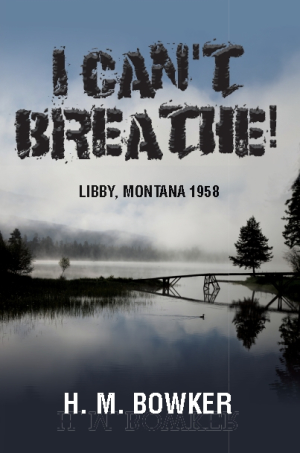I Can't Breathe!
Libby, Montana 1958
This compelling and chilling story of corporate and child abuse is one that needs to be told.
H. M. Bowker’s mystery novel, I Can’t Breathe! Libby, Montana 1958, is a tale of child abuse, death, and corporate exploitation of human life. Like mining for hard rock minerals, this book grinds slowly and inexorably toward its conclusion. Reflecting real life, good triumphs over evil—mostly, that is, and in a haphazard way.
Libby is a very small town in northwestern Montana that was the site of one of the worst environmental disasters in US history. The town was dominated for much of the twentieth century by an asbestos mine. The material from the mine infiltrated the entire town, and hundreds, if not thousands, of people got sick from their exposure to the asbestos. Bowker builds on this history to craft a plot that explores both corporate abuse and child abuse. She creates a truly dark world in which there are few heroes.
The Bowmans, typical of hardworking people who have lived in Libby or in towns like it for decades, become the distillate of the abusive family. Dewey, the father, is the unsuspecting owner of a music store. Betty, the mother, suffers from serious mental illness. She argues with voices in her head and vents her anger by beating her three daughters. There is an abundance of material here for a riveting and enlightening plot. And, overall, the novel tells a compelling and chilling story.
However, the book often reads like the material for a workshop on family dynamics and child abuse and neglect. The characters all engage too often in introspection, signified in the text by material set in italics. In the end, there is too much explanation and not enough action.
The writing also suffers from repetition of details, which slows down the narrative. For example, it’s mentioned numerous times that the middle daughter, Julie, is fourteen years old, and that her sister, Helen, about six. The flow of the plot is also interrupted with fill-in background material from an earlier time. Eric Bowman is introduced on the first page, but his relationship with the rest of the Bowman family is not explained until much later. At times, the book reads like the script for a documentary film, as the scene is set for action that should come later.
The ending of the tale regarding the abuse of the Bowman children is too fantastical. While great for a Hollywood movie, for a mystery novel that purports to reflect real life, it is overly complicated and serious questions are left unanswered.
There is definitely a story here that needs to be told. With some work, I Can’t Breathe could be an excellent mystery novel.
Reviewed by
John Senger
Disclosure: This article is not an endorsement, but a review. The publisher of this book provided free copies of the book and paid a small fee to have their book reviewed by a professional reviewer. Foreword Reviews and Clarion Reviews make no guarantee that the publisher will receive a positive review. Foreword Magazine, Inc. is disclosing this in accordance with the Federal Trade Commission’s 16 CFR, Part 255.

